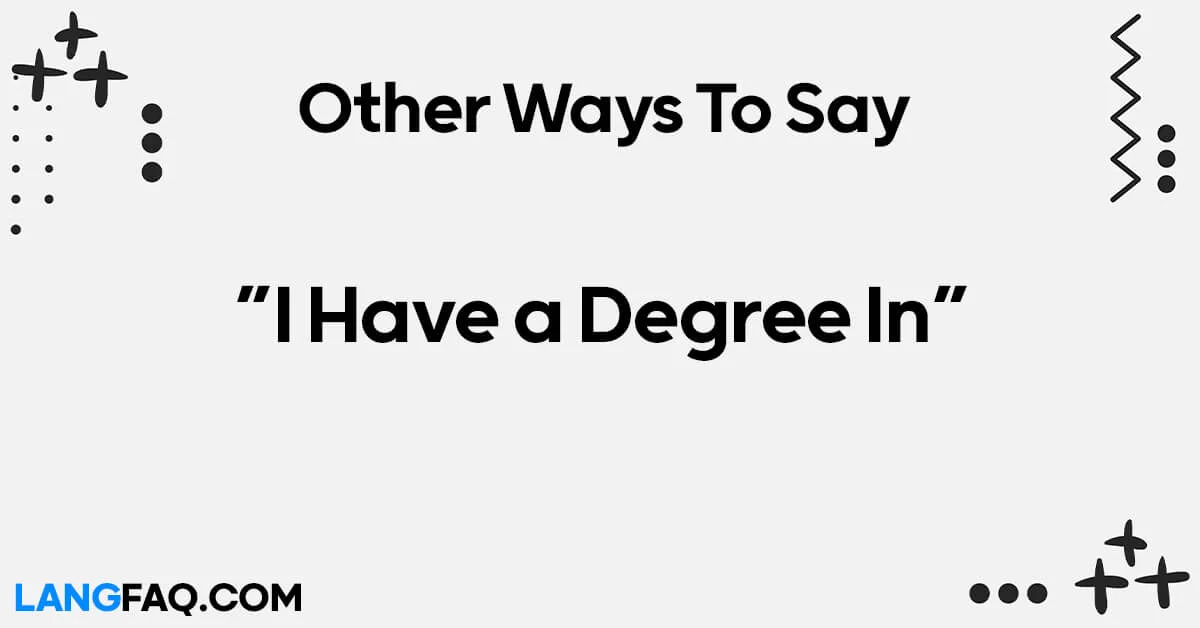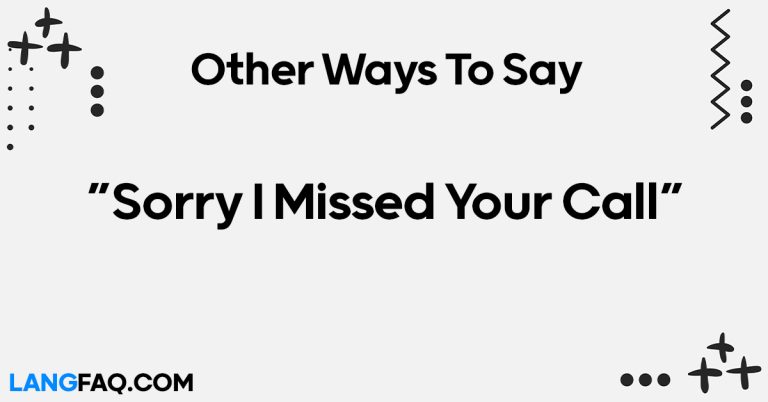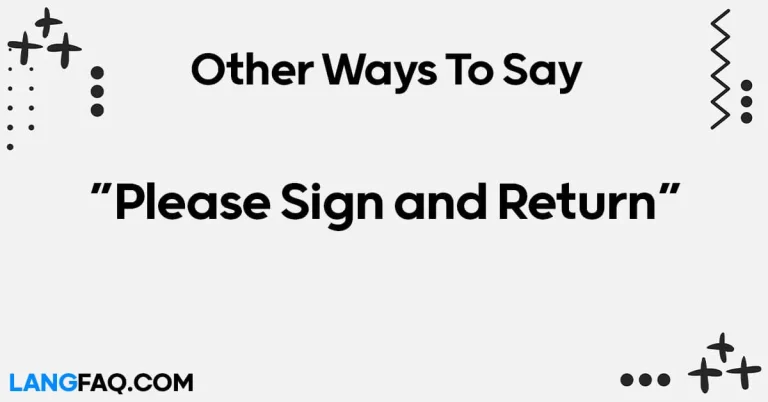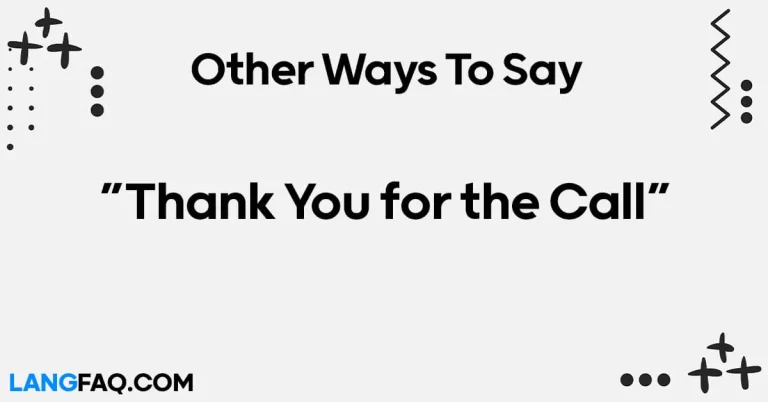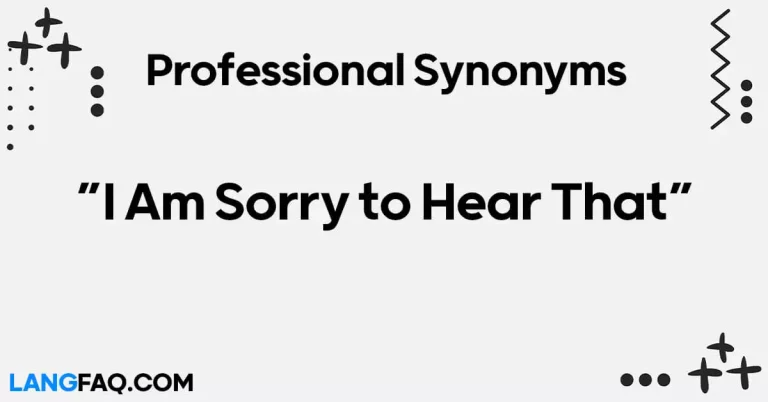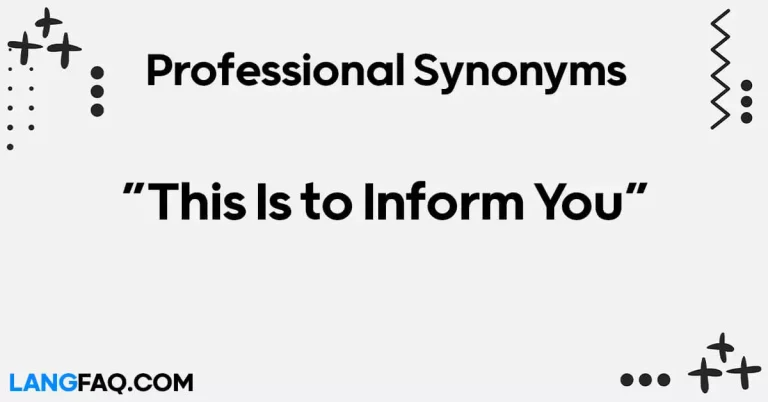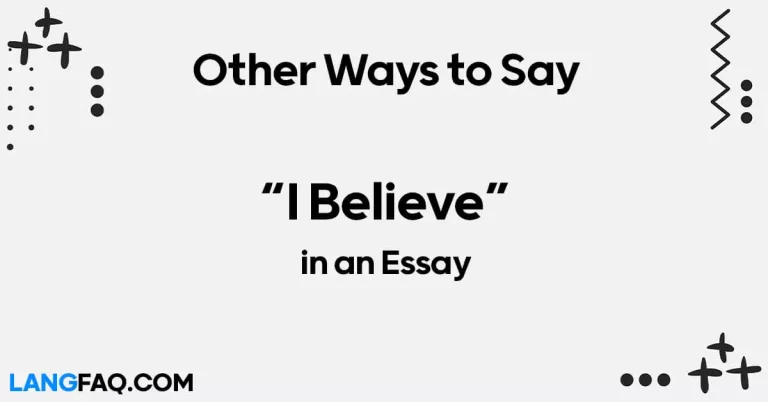Embarking on a professional journey often involves flaunting your academic achievements. Instead of the conventional “I Have a Degree In,” spice up your expressions to make a lasting impression. In this article, we delve into 12 distinctive ways to convey your educational background creatively.
12 Other Ways to Say “I Have a Degree In”
Here are 12 alternative ways to say “I Have a Degree In” in English:
- I hold a degree in…
- My academic background includes a degree in…
- I graduated with a degree in…
- My educational journey led me to earn a degree in…
- I am a proud recipient of a degree in…
- I completed my studies with a degree in…
- My expertise lies in the field of…
- I am formally educated in…
- I possess a qualification in…
- I’ve been awarded a degree in…
- My educational accolades encompass a degree in…
- I’ve successfully obtained a degree in…
Here’s a table with the meaning and examples of the alternative ways to say “I Have a Degree In”:
| Expression | Meaning | Example |
|---|---|---|
| I hold a degree in… | Possession of an academic qualification | I hold a degree in Computer Science. |
| My academic background includes a degree in… | Educational history with a specific qualification | My academic background includes a degree in Business Management. |
| I graduated with a degree in… | Completion of studies with a specific qualification | I graduated with a degree in Psychology. |
| My educational journey led me to earn a degree in… | Achievement through an educational path | My educational journey led me to earn a degree in Economics. |
| I am a proud recipient of a degree in… | Personal pride in receiving a specific qualification | I am a proud recipient of a degree in Environmental Science. |
| I completed my studies with a degree in… | Successful completion of studies with a specific qualification | I completed my studies with a degree in Mechanical Engineering. |
| My expertise lies in the field of… | Specialized knowledge in a particular area | My expertise lies in the field of Marketing. |
| I am formally educated in… | Formal education in a particular subject | I am formally educated in Biochemistry. |
| I possess a qualification in… | Ownership of a specific academic qualification | I possess a qualification in Information Technology. |
| I’ve been awarded a degree in… | Recognition and receipt of a specific academic qualification | I’ve been awarded a degree in English Literature. |
| My educational accolades encompass a degree in… | Inclusion of academic achievements with a specific qualification | My educational accolades encompass a degree in Finance. |
| I’ve successfully obtained a degree in… | Successful acquisition of a specific academic qualification | I’ve successfully obtained a degree in Political Science. |
Expressing your educational background creatively can enhance your communication skills and make you stand out. The diverse phrases provided offer a range of options to articulate your academic achievements effectively. Choose the one that resonates with your personal style and context for a more engaging expression.
Is It Correct to Say “I Have a Degree In”?
Navigating the nuances of language is essential, especially when articulating one’s educational background. The phrase “Is It Correct to Say ‘I Have a Degree In’?” opens the door to a discussion on the appropriateness of using this conventional expression. This alternative heading can be employed when providing guidance or insights on language usage, making it suitable for educational blogs, language forums, or even casual discussions among peers.
Example in a Language Forum: “Is it correct to say ‘I have a degree in’ when mentioning academic qualifications, or are there more eloquent alternatives that can be used in formal contexts?”
Email Sample:
Subject: Seeking Clarification on Proper Expression of Academic Achievements
Dear [Recipient],
I trust this email finds you well. I recently came across various ways to articulate one’s educational background and was curious about the correctness of the phrase ‘I have a degree in.’ Could you please provide some insights or alternatives that might be more suitable in formal settings?
Thank you in advance for your guidance.
Best regards,
[Your Name]
Dictionary Insight: According to Cambridge Dictionary, the phrase “I have a degree in” is grammatically correct and widely accepted. However, exploring alternative expressions can add flair and diversity to language use.
Usage Tips: While the phrase is grammatically correct, incorporating alternative expressions can enhance your communication skills and add a touch of creativity to your language.
Pros:
- Widely understood and accepted.
- Simple and straightforward.
Cons:
- Can be perceived as conventional and lacks creativity in certain contexts.
Professional Mail Example With “I Have a Degree In”
Subject: Inquiry Regarding Employment Opportunities
Dear [Recipient’s Name],
I trust this email finds you well. My name is [Your Name], and I am writing to express my interest in the [Job Title] position at [Company Name] as advertised on your website. I recently came across the job description and was intrigued by the exciting opportunities your company offers in the [Industry/Field].
I have a degree in Business Administration from [University Name], where I honed my skills in strategic planning, project management, and team collaboration. Throughout my academic journey, I undertook various projects that required critical thinking and problem-solving, skills I believe align well with the demands of the [Job Title] role.
In my previous position at [Previous Company], I successfully led a team through a major product launch, achieving a 20% increase in sales within the first quarter. My hands-on experience in [Relevant Skills] has equipped me with the ability to contribute effectively to [Company Name] and its dynamic work environment.
I am particularly drawn to [Company Name] because of its commitment to innovation and dedication to [specific industry or value]. I am confident that my academic background and professional experience make me a strong fit for the challenges and opportunities that come with the [Job Title] position.
I have attached my resume for your perusal, and I would be delighted to further discuss how my skills and experiences align with the needs of your team. Can we schedule a convenient time for an interview? I am available [your availability].
Thank you for considering my application. I am eager to contribute to [Company Name] and bring my passion for [industry] to your esteemed team.
Looking forward to the possibility of discussing my candidacy in more detail.
Best regards,
[Your Full Name] [Your Contact Information] [LinkedIn Profile, if applicable]
Credentials I Hold
In the realm of professional interactions, expressing your academic achievements is crucial. One effective way to convey this is by stating the credentials you hold. This phrase implies a sense of authority and formality, making it ideal for resumes, formal introductions, or professional networking.
Scenario: Formal Context (Job Interview): Interviewer: “Can you tell us about your educational background?” Candidate: “Certainly, I am delighted to share the credentials I hold, which include a Bachelor’s degree in Computer Science and a Master’s degree in Business Administration.”
Informal Context (Colleague Chat): Colleague: “I heard you recently finished your studies. What’s your field?” You: “Yes, indeed. I’m excited to share the credentials I hold—a degree in Environmental Science.”
Variations:
- Professional Variation: “Allow me to present the professional credentials I hold.”
- Colleague Variation: “Let me share the credentials I hold in our field.”
- Friend Variation: “You know, among my friends, I often joke about the credentials I hold.”
Email Sample:
Subject: Introduction and Credentials
Hi [Recipient’s Name],
I hope this email finds you well. I wanted to take a moment to introduce myself and share the credentials I hold. I recently completed my studies in [Your Field], specializing in [Your Specialization]. I am thrilled to bring this knowledge to our team and contribute to our shared success.
Best regards, [Your Full Name]
Educational Attainment
Navigating My Educational Odyssey
Education is a journey, and using the phrase “educational attainment” allows you to frame your academic background as an ongoing expedition. This expression is versatile, fitting both formal and informal contexts, and it subtly emphasizes the effort and dedication invested in reaching your educational goals.
Scenario: Formal Context (Networking Event): Speaker: “Please introduce yourselves and highlight your achievements.” You: “Hello everyone, I’m honored to be here. I’ll be sharing my educational attainment, which spans a Bachelor’s in Psychology and a Ph.D. in Behavioral Sciences.”
Informal Context (Family Gathering): Relative: “What have you been up to lately?” You: “Oh, just continuing my educational attainment—currently pursuing a degree in Astrophysics.”
Variations:
- Formal Variation: “Allow me to discuss my formal educational attainment.”
- Informal Variation: “Casually updating you on my ongoing educational attainment.”
- Networking Variation: “Excited to connect and share insights about my educational attainment.”
Email Sample:
Subject: Educational Attainment Update
Dear [Recipient’s Name],
I trust this email finds you in good spirits. I wanted to share a quick update on my educational attainment. Recently, I completed a certification course in [Your Certification]. The journey continues, and I look forward to keeping you posted on my academic ventures.
Warm regards, [Your First Name]
My Scholarly Pursuits
A Chronicle of My Academic Endeavors
Choosing the phrase “my scholarly pursuits” adds a touch of elegance to your narrative. It goes beyond merely stating your degree and invites curiosity about your intellectual endeavors. This is particularly effective when you want to highlight your commitment to continuous learning.
Scenario: Formal Context (Conference Presentation): Presenter: “Tell us about your research background.” You: “Certainly. Today, I’ll be discussing my scholarly pursuits—a journey that encompasses extensive research in Quantum Physics.”
Informal Context (Friend’s Gathering): Friend: “What’s new with you these days?” You: “Just catching up on my scholarly pursuits—recently delving into ancient philosophy.”
Variations:
- Academic Variation: “Allow me to delve into my recent academic pursuits.”
- Social Variation: “Sharing a glimpse of my scholarly pursuits among friends.”
- Mentor-Mentee Variation: “Guiding you through my scholarly pursuits as your mentor.”
Email Sample:
Subject: Update on My Scholarly Pursuits
Hello [Recipient’s Name],
I hope this email brightens your day. I wanted to share a quick update on my scholarly pursuits. I’ve been engrossed in a research project exploring [Your Topic], and the findings are truly fascinating. Looking forward to discussing it further when we catch up.
Best regards, [Your Full Name]
The Diplomas I Bear
Showcasing My Educational Accomplishments
Expressing that you bear diplomas adds a tangible and visual element to your academic achievements. It conveys a sense of pride and accomplishment, making it suitable for contexts where you want to emphasize the concrete proof of your education.
Scenario: Formal Context (Award Ceremony): Host: “Please step forward and share your achievements.” You: “Honored to showcase the diplomas I bear—a testament to years of dedication and hard work.”
Informal Context (Casual Conversation): Acquaintance: “What’s hanging on your wall?” You: “Just the diplomas I bear—a constant reminder of the educational milestones I’ve conquered.”
Variations:
- Ceremonial Variation: “Presenting the ceremonial diplomas I bear with pride.”
- Informal Variation: “Chatting about the informal diplomas I bear in my favorite subjects.”
- Professional Variation: “In a professional setting, highlighting the professional diplomas I bear.”
Email Sample:
Subject: Sharing the Diplomas I Bear
Dear [Recipient’s Name],
I trust this email finds you well. I wanted to share a glimpse of my recent accomplishments—specifically, the diplomas I bear proudly. These symbols of dedication and learning continue to inspire me on my professional journey.
Warm regards, [Your First Name]
Majors and Minors I Pursued
Illuminating My Specialized Fields of Study
When you’ve explored multiple disciplines, using “majors and minors I pursued” allows you to showcase a diverse skill set. This phrase is especially effective when discussing your academic versatility and adaptability.
Scenario: Formal Context (Job Interview): Interviewer: “Can you elaborate on your academic background?” You: “Certainly. Let me walk you through the majors and minors I pursued—a combination of Economics as my major and Graphic Design as my minor.”
Informal Context (Coffee Chat with a Colleague): Colleague: “I didn’t know you had such a varied academic background.” You: “Absolutely! Let me share the majors and minors I pursued—Philosophy as my major and Marketing as my minor.”
Variations:
- Professional Variation: “Exploring the professional majors and minors I pursued.”
- Colleague Variation: “Discussing with colleagues the majors and minors I pursued in our shared field.”
- Friend Variation: “Sharing with friends the majors and minors I pursued during my academic journey.”
Email Sample:
Subject: Overview of Majors and Minors I Pursued
Hello [Recipient’s Name],
I hope this email finds you in high spirits. I wanted to provide a brief overview of the majors and minors I pursued during my academic journey. This diverse educational background fuels my passion for [Your Field], allowing me to approach challenges with a multifaceted perspective.
Best regards, [Your Full Name]
Fields of Expertise
Unmasking My Proficiency Areas
When you want to highlight your expertise without explicitly stating your degree, “fields of expertise” is a powerful phrase. It allows you to showcase the practical skills and knowledge you’ve gained in specific areas.
Scenario: Formal Context (Networking Event): Speaker: “What areas do you specialize in?” You: “I’m delighted to unmask my fields of expertise—strategic planning, project management, and data analysis.”
Informal Context (Family Dinner): Relative: “What do you bring to the table professionally?” You: “Let me unmask my fields of expertise—content creation, digital marketing, and social media management.”
Variations:
- Professional Variation: “In professional settings, unmasking my professional fields of expertise.”
- Informal Variation: “Casually unveiling my informal fields of expertise among friends.”
- Mentor-Mentee Variation: “Guiding my mentee by unmasking my mentorship fields of expertise.”
Email Sample:
Subject: Unveiling My Fields of Expertise
Dear [Recipient’s Name],
I trust you’re having a fantastic day. I wanted to take a moment to share more about myself professionally by unveiling my fields of expertise. These areas, including [Expertise 1], [Expertise 2], and [Expertise 3], have been central to my career journey.
Warm regards, [Your First Name]
Mastering My Craft
Elevating My Skills and Knowledge
When you’ve invested time in refining your skills, “mastering my craft” is a compelling phrase. It conveys a sense of dedication and continuous improvement, making it suitable for discussions about your professional growth.
Scenario: Formal Context (Team Meeting): Manager: “How have you been enhancing your skills?” You: “I’ve been dedicated to mastering my craft—attending workshops, pursuing certifications, and staying updated with industry trends.”
Informal Context (Networking Event): Peer: “What’s your secret to success in your field?” You: “Honestly, it’s about mastering my craft—constantly learning, adapting, and pushing the boundaries of what I can achieve.”
Variations:
- Formal Variation: “Discussing in formal settings the continuous journey of mastering my craft.”
- Informal Variation: “Chatting casually about the laid-back approach to mastering my craft among friends.”
- Mentor-Mentee Variation: “Guiding my mentee through the process of mastering their craft as a mentor.”
Email Sample:
Subject: Embracing the Journey of Mastering My Craft
Hello [Recipient’s Name],
I hope this email brightens your day. I wanted to share a quick update on my professional journey—specifically, the continuous process of mastering my craft. The commitment to lifelong learning has truly shaped my career path.
Best regards, [Your Full Name]
My Intellectual Forays
Chronicling My Intellectual Exploits
Expressing your educational background as “intellectual forays” adds a touch of adventure to your narrative. It suggests an exploration of knowledge and a willingness to push boundaries, making it ideal for situations where you want to highlight your intellectual curiosity.
Scenario: Formal Context (Conference Presentation): Presenter: “Tell us about your academic research.” You: “Certainly. Today, I’ll be chronicling my intellectual forays—an exploration that spans interdisciplinary studies and groundbreaking research.”
Informal Context (Coffee Chat with a Friend): Friend: “What’s the most exciting thing you’ve learned lately?” You: “Let me share with you—chronicling my recent intellectual forays into quantum computing has been truly mind-boggling.”
Variations:
- Academic Variation: “Delving into my academic pursuits by chronicling my intellectual forays.”
- Social Variation: “Casually sharing among friends the intellectual forays that keep me engaged.”
- Mentor-Mentee Variation: “Guiding my mentee through the process of chronicling their intellectual forays.”
Email Sample:
Subject: Sharing Insights from My Intellectual Forays
Dear [Recipient’s Name],
I hope this email finds you well. I wanted to share some insights from my recent intellectual forays. The journey has been enlightening, and I’m eager to discuss it further when we connect.
Warm regards, [Your First Name]
Expertise Unveiled
Laying Bare My Academic Proficiency
When you want to emphasize transparency and honesty in your academic background, “expertise unveiled” is a powerful phrase. It suggests a candid discussion about your proficiency and competence.
Scenario: Formal Context (Job Interview): Interviewer: “How do you assess your academic strengths?” You: “In the spirit of openness, I believe in laying bare my academic proficiency—strong analytical skills, effective communication, and a deep understanding of market trends.”
Informal Context (Family Gathering): Relative: “What sets you apart in your field?” You: “I’m all about expertise unveiled—my academic proficiency in project management and team collaboration is what makes me stand out.”
Variations:
- Professional Variation: “Discussing in professional settings the concept of expertise unveiled in my academic journey.”
- Informal Variation: “Chatting casually about the down-to-earth approach of expertise unveiled among friends.”
- Mentor-Mentee Variation: “Guiding my mentee through the process of laying bare their academic proficiency.”
Email Sample:
Subject: Embracing Expertise Unveiled
Hello [Recipient’s Name],
I trust this email finds you thriving. I wanted to share a perspective on my academic journey—embracing expertise unveiled. This approach allows for a transparent and genuine understanding of my strengths in [Your Field].
Best regards, [Your Full Name]
Scholarly Conquests
Narrating My Triumphs in the Academic Realm
When you want to convey a sense of accomplishment and triumph in your academic journey, “scholarly conquests” is a captivating phrase. It suggests overcoming challenges and emerging victorious in the pursuit of knowledge.
Scenario: Formal Context (Panel Discussion): Moderator: “Share a defining moment in your academic career.” You: “Certainly. Today, I’ll be narrating my scholarly conquests—a journey marked by research breakthroughs, academic awards, and unwavering determination.”
Informal Context (Coffee Chat with a Colleague): Colleague: “What’s your proudest academic moment?” You: “Let me share with you—narrating my scholarly conquests, from conquering challenging courses to presenting at prestigious conferences, has been incredibly fulfilling.”
Variations:
- Academic Variation: “Delving into my academic pursuits by narrating my scholarly conquests.”
- Social Variation: “Casually sharing among friends the triumphs and challenges of my scholarly conquests.”
- Mentor-Mentee Variation: “Guiding my mentee through the process of narrating their own scholarly conquests.”
Email Sample:
Subject: Reflecting on Scholarly Conquests
Dear [Recipient’s Name],
I hope this email brings positivity to your day. I wanted to take a moment to reflect on my academic journey by narrating my scholarly conquests. From rigorous research to academic achievements, it has been a rewarding adventure.
Warm regards, [Your First Name]
FAQs
Q: Are these alternative phrases widely accepted in professional settings? Absolutely! While maintaining professionalism, injecting creativity into your language can set you apart positively.
Q: Can I use these expressions on my resume? Certainly! Your resume is a reflection of your personality; using creative language can make it more engaging.
Q: How do these alternatives resonate in job interviews? Employers appreciate candidates who can articulate their achievements uniquely; it adds a memorable touch to your interview.
Q: Are there any situations where conventional language is more appropriate? In formal documents or legal contexts, sticking to standard language may be advisable. Gauge the setting accordingly.
Q: Can these phrases be adapted for non-English resumes? Absolutely! The essence of creative expression can be translated into various languages for a global touch.
Q: Should I use these alternatives in academic settings? While formalities are essential, incorporating creativity can make your academic presentations or discussions more engaging.
Conclusion
In the world of professional communication, standing out is crucial. By adopting these 12 alternative ways to express your educational background, you not only showcase your achievements but also demonstrate your creativity and communication skills. Experiment with these phrases and find the one that resonates best with your personal style.

